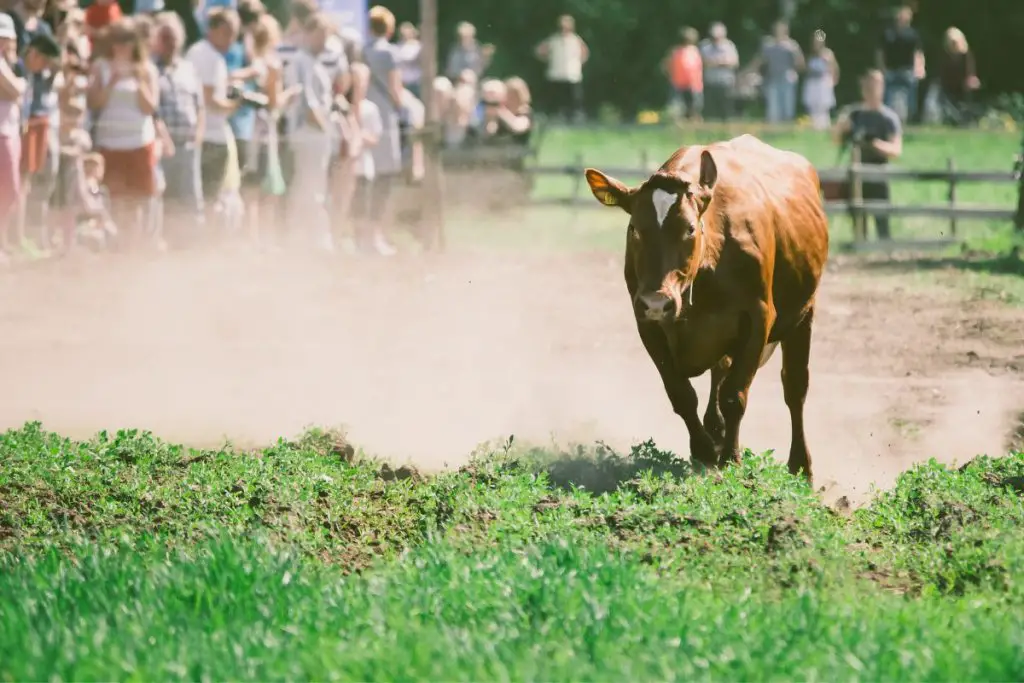Cows can run between 15 to 20 miles per hour, while bulls can reach speeds up to 30 miles per hour at full gallop, but this can only be done in short bursts. The fastest-known speed is 35 miles per hour by a bull.
While it’s not a highly critical matter when selecting a cow to rear, knowing how fast a cow can run is crucial for safety reasons for you, other people on the farm, visitors, and even the animal itself.
Besides knowing the running speeds of cattle, you may also want to know when, how long, how far, and why they run in the first place.
Since you are already here, let’s go on a curious run and find the answers to all these questions.
Table of Contents
When Do Cows Run?
Running isn’t inherently instinct in animals like cows, which means that under normal circumstances, a cow would best prefer to laze around chewing the cud or grazing leisurely.
Cows are large animals whose bulkiness limits movement mostly to only walking and jumping. Running only occasionally happens for cows, preferably when it’s absolutely necessary.
Why Do Cows Run?
A cow may break into a run because of the following:
- Excitement: Cows may run when they feel playful amongst themselves or when they want to play around with their caretaker.
- Fear: Sudden loud sounds like the barking of dogs or the roaring of motor vehicle engines can startle bovines and cause them to run out of fear for their lives.
- Imminent danger: Cows will always run when they see or sense potentially life-threatening situations from humans and predators. Cows won’t want to fall prey animals to meat-eaters like wolves, bears, cougars, wild dogs, and coyotes.
- Desire to thwart threats: Cows may run to attack people or other animals that threaten their young ones or any other herd member.
How Fast Do Cows Run?
Cows can run swiftly at 17 miles per hour for a short period. The average speed for most cows (female) is 15-20 miles per hour, while bulls can average high speeds of 20-30 miles per hour at full gallop.
The highest known running speeds for bovines are 25 miles per hour (40km/hr) and 35 miles per hour, the latter which was attained by a bull at the famous ‘Running Of The Bulls’ event.
Factors That Determine How Fast A Cow Can Run
The running speed of a cow depends on several factors, including:
- Weight or body size: Smaller and lighter cows will run faster.
- Age: In cattle, as in humans, advancement in age limits normal activities like movement. For example, heifers can run faster than adult cows because they don’t have the baggage of a bulky udder. Similarly, steers can run faster than matured beef bulls that have more muscle mass.
- Environment: Cattle living in cooler areas will have lower running speeds because their muscles receive less oxygen.
- Surface: While the hooves of cows grip grassy grounds well, slippery and rocky surfaces limit their running speed.
- Breed: There’s no conclusive scientific determination of the exact running speeds for different cattle breeds, but you can expect larger animals like Piedmontese, with their double-muscling attribute, to run slower than a smaller breed like Zebu.
- Gender: Dairy cows will run slower than bulls because they have a bulky udder between the hind legs. Or they may be limited by their calf, whom they can’t abandon.
- Training: In bovine sports such as bullfighting (banned in countries like New Zealand and Canada) and rodeos (common in North America), bulls are trained on how to run fast and safely to increase their chances of winning in competitions.

Can Cows Run Faster Than Humans?
Cows run faster than us humans, so you shouldn’t expect to outrun a cow. Just look at these stats:
| Humans | Cows | |
| Average Running Speed | 6.2 to 8.5 miles per hour | 17 to 30 miles per hour |
| Running Without Resting | 2 Hours+ | 2 Hours+ |
| Distance Per Day | Up to 70 Miles | Up to 20 Miles |
| Weight | 150 to 350lbs | 1,000 to 2,700lbs |
The average human running speed for an adult is between 6.2 and 8.7 miles per hour. Adult males can attain a top speed between 7.1 and 8.5, while women can achieve between 6.3 and 7.3 miles per hour.
The fastest human in the world now is Usain Bolt, who recorded a top speed of 27.8 miles per hour in 2009. He also holds the record for the fastest human speed in a 100-m sprint.
Now, that’s quite fast, but you bet Usain can’t outrun the fastest cow running at 35 miles per hour in a straight line! Like bovines, human running speed varies by age, gender, body size, health condition/fitness, training (think athletes), surface, and clothing (shoe types).
Although you can’t outrun a cow if you two ‘race each other’ along a straight line, you stand a better chance because cows can’t cover long distances. Also, they can’t change direction swiftly like humans because of poor coordination of all four legs.
How Far Do Cows Run?
Given average bovine speeds of 15-20 miles an hour, a cow can technically run as far as 15-20 miles within an hour. In between several rests, a cow can typically run as far as 20-30 miles in a day.
However, this is easier said than done. For example, a harsh surface or terrain will reduce this number. Ideally, a cow has better chances of running that far if she runs in a relatively straight line.
To provide a more relatable number, most cows can cover between 300 and 350 feet within the first few seconds of the gallop. The typical running distance within the first 12.8 seconds is about 328 feet.
For How Long Can A Cow Run?
Since running isn’t an inherent instinct in cattle, they can’t keep up high speeds for a long time. The speed keeps decreasing the longer the cow runs.
The average cow can run for up to two hours straight without resting. Some farmers believe that cows can run up to five hours consecutively, but that’s quite difficult and would most likely be an isolated case.
Why Should I Care How Fast A Cow Can Run?
As mentioned initially, a cow’s speed isn’t a huge deciding factor when choosing a family cow. But for safety reasons for yourself and others on the farm, it’s helpful to know cows can outrun you. You’ll want to take measures to keep yourself safe from a charging cow.
What Could Go Wrong For A Cow When She Runs?
Everything could go wrong for a cow when she breaks into a run. The consequences may include:
- Internal bleeding or internal injuries, such as broken ribs
- Death (from prolonged runs or extreme injuries sustained during a run)
- External injuries, such as broken limbs
- Injury or death to young cattle and other members of a herd
- Pain from injury
What To Do If A Cow Is Chasing You
If a cow chases you, the tips below can help you escape with your life:
- Do not show your back to the cow. If possible, keep facing her and do your best to study her moves. But again, you stand a chance this way if there aren’t stumbling blocks behind you!
- Do not run. Instead, walk fast and try to avoid the cow.
- Avoid direct eye contact. She can read the fear in your eyes.
- Try to deter the cow from attacking by hitting her nose with a stick. Ensure you land the hit as a miss might agitate her more.
- If you have your dog on a leash, let go of it to increase the chances of you and the dog avoiding injury. Remember, cows have an aversion to dogs, and many people are attacked by cows when with their dogs.
- Avoid getting close to cows you don’t own in the first place. (Cows you aren’t familiar with.)
- If you must run, do not run in a straight line. Instead, run in zig-zag patterns because cows can’t change direction swiftly.
- Be loud. Make noises to scare the cow away. Call for help loudly; someone might be close by.
- If possible, run down a hill.
- Look for a barrier or shelter to separate you and the cow.
Although cows do not have an inherent need to run, they can achieve high speeds when they do, which poses dangers to the cows themselves and the people close to them.
For your safety, you won’t want to get in the path of a running cow. If you do, try your best to ensure the safety of both you and the cow.
